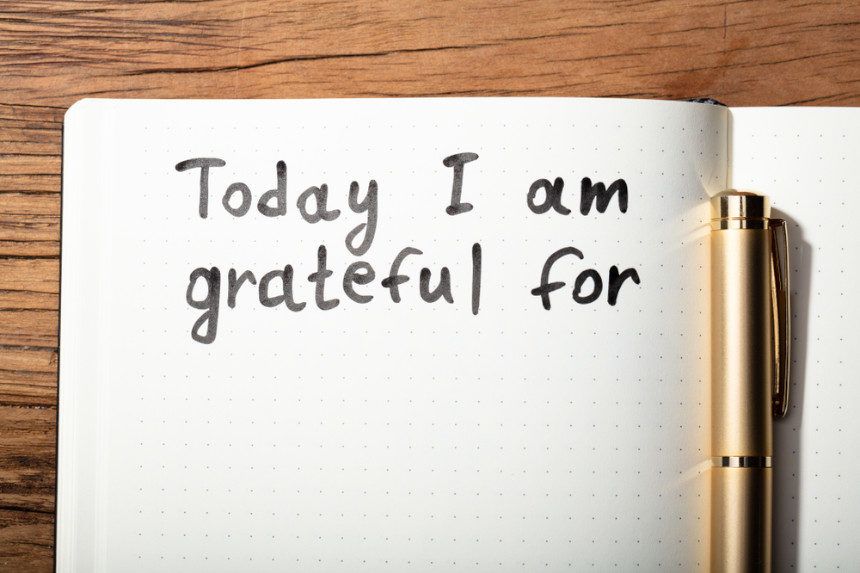I first heard this article’s title phrase during snack time from one of my daughters when they were quite young. Our younger daughter, who was almost three at the time, wasn’t happy with the size of her portion of snacks and let my wife and I know of her displeasure in no uncertain terms: “More, more, more!” at a very high volume. It was at this point that my older daughter, who was then almost five, sang, “Get what you get and don’t get upset.” I looked at her quizzically and asked where she learned that. She said that her music teacher sang a song that morning with that line in the lyrics, and it meant we should be grateful for what we have and shouldn’t get upset because we don’t get everything we want. Needless to say, that argument didn’t sit well with our near-apoplectic younger daughter.
As the saying goes, “out of the mouths of babes.” I was struck by the unadorned profundity of my older daughter’s pronouncement of the importance of gratitude in our lives and by how this notion is so relevant to all of us in this world where for many, enough is never enough while many others don’t have enough.
Gratitude is such a simple, yet powerful emotion. In fact, one of the most surprising and robust findings in research on happiness is the effect that expressing gratitude has on one’s basic level of happiness. In a nutshell, when people express gratitude, they feel happier for several days. And, not unexpectedly, the recipients of that gratitude feel pretty darned good too.
Unfortunately, gratitude is not highly valued in our culture. We regularly see business leaders, professional athletes, and entertainers who are entitled and ungracious for all they have received. They expect to get what they get and see no reason to thank those who gave it to them because, in their mind’s, they deserve it!. Simple expressions of gratitude, such as “Thank you,” “Your support means a lot to me,” or “I really appreciate the opportunities you have given me” are quite alien in today’s culture.
There are three forces that make it difficult for us to feel gratitude in our lives:
- First, we are a comparative society in which individuals base their happiness on how they stack up to others. The research on happiness suggests that we judge our well being in part on our most immediate comparison group. That group used to be the people we interacted with in our communities which, in general, were comprised of people similar to ourselves. So our comparisons indicated that we were in about the same place as those around us and so could be grateful to have what we had. But the explosion of technology in recent years has brought thousands of TV channels and the Web into our homes, the result of which is a new and vastly larger community to which we compare ourselves. How can we be grateful for what we have when so many seem to have so much more (plus they seem so much happier to boot)?
- Second, we live in an aspirational society in which we are constantly searching for the BBD (Bigger Better Deal). Why settle for a 30″ flat-panel TV when we can have a 52″? How can a $25,000 car be good enough, when we can have a $45,000 car? And for our children, good grades and a good college are no longer sufficient; only straight As and the very best schools will suffice. The recent financial crisis was driven by Wall Streeters who didn’t think that earning millions of dollars was enough, so they invented newer (and riskier) ways to make even more money. The mistaken belief is that if we finally get more, bigger, and better we will be happier. How can we be grateful when what we have isn’t as good as what we could have?
- Third, to quote Madonna, we live “a material world” in which popular culture has brainwashed many into believing that our self-worth is derived from what we have rather than who we are. There is always the next cool thing to buy (did someone say iPhone or Tesla?) that we fully expect will make us feel the way we want to feel but haven’t been able to because what we had wasn’t quite good enough. How can we be grateful when there are so many amazing products that we absolutely must have for us to be happy?
The problem is that, by never being satisfied with what we have, we can never be grateful for what we have. And, by extension, in always wanting more, more, more, we feel unsatisfied and inadequate about who and where we are now. We need to step back and gain perspective. Compared to about 99 percent of the world, we have so much. We should feel fortunate, not wanting.
There are loads of upsides to gratitude. Aside from the happiness boost you get, gratitude has also been related to higher energy, a more optimistic attitude, and greater empathy toward others. And you make the people to whom you express gratitude happy. Gratitude also has survival value. When you express gratitude toward others, they’re more likely to help you in the future, thereby increasing your chances of survival. And that alone is worth feeling gratitude for.
Thanks to my elder daughter, “Get what you get and don’t get upset” has become a mantra in our family that we use with our children and that — turnabout is fair play — they use on us too.
And our family makes gratitude a part of our dinnertime ritual in which we hold hands, close our eyes, take a deep breath, and express gratitude to whomever we wish.
So next time you start feeling jealousy and envy for of all that you don’t have, stop for a moment and recognize all that you do have and just be grateful. And then turn to people who have helped you get all that you have and express your gratitude to them.
Featured image: Shutterstock.
Become a Saturday Evening Post member and enjoy unlimited access. Subscribe now



